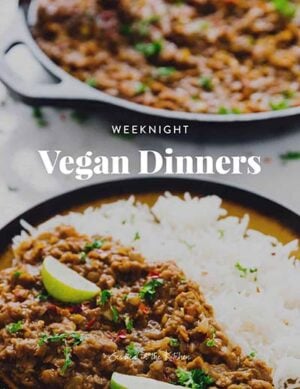Is Honey Vegan?
If you’re new to veganism, you may be wondering, “is honey vegan?” Here’s what you need to know.
There’s a whole lot to navigate as a new vegan, and the process can definitely be overwhelming.
Although I’ve been a vegan for many years now, I remember the frustration and disappointment of realizing some of my former favourite foods contained hidden animal-derived ingredients.
Honey is an area of uncertainty for many new vegans—and also friends and family who are cooking for them! Let’s take a deep-dive to answer the question of whether honey is vegan.
What Is Honey?
Honey is a sweet, golden liquid produced by bees. It has been used since ancient times for its medicinal properties, sweetness, and flavor.
Technically speaking, honey contains around 80% carbohydrates, 15 to 17% water, and the rest is minerals, vitamins, pollen, and amino acids. The carbohydrates in honey are primarily fructose and glucose, but it has a slightly lower glycemic index than table sugar, which is why it’s often perceived as a healthier alternative.
How and Why Bees Make Honey
Bees make honey from the sugary nectar of flowers. Bees use their tongues to lap up the nectar and then store it in a special part of their stomachs, known as honey sacs. After returning to the hive, they regurgitate the nectar and a process of evaporation and enzyme-reaction takes place in the hive, reducing the water content of the nectar and producing the signature amber color and sweet flavor of honey.
Bees make honey for two main reasons: to feed their colonies in winter and to sustain new bee colonies. Honey keeps well, providing bees with a stable food source throughout the year. It also offers an important source of nutrition for newly established hives. When beekeepers remove honey from a hive, they replace it with a corn-syrup-based substitute that lacks the essential nutrients of honey.
Why Honey Isn’t Vegan
So is honey vegan? The answer is no.
Vegans avoid consuming all products that are derived from animals or animal byproducts, including honey. Strict ethical vegans do not consume honey or use it in their recipes. (What Does It Mean to Be Vegan?)
The production of honey involves exploiting bees and denying them their autonomy as living beings. While some ethical beekeepers try to minimize the impact on bees, commercial beekeeping operations often fail to take into account the needs of the bee community. Bees are highly social beings and rely heavily on their colonies for survival. The intensive practices of commercial beekeeping often disrupt the social structure of the hive, leading to poor health and reduced production.
As with the dairy industry, honeybees are often artificially inseminated, and bees may also be killed before winter to save on the costs of feeding them through the cold months.
Honey production and beekeeping can also cause environmental harm. Large, commercial operations often ship bees across the country to pollinate crops. This disrupts the bees’ natural migratory patterns. Commercial honey production also produces honeybee colonies that supplant native bee populations.
Plant-Based Honey
Luckily, there are a number of vegan honey substitutes on the market today—and yes, they really do taste like actual honey!
Some popular brands include Bee Free Honey, Nectar, Vegan Un-Honey, Just Like Honey, and Humble Honee. You can use these vegan honey substitutes the same way you use regular honey.
More Vegan Alternatives to Honey
If you can’t find the vegan honey substitutes listed above, don’t despair! You can also substitute these sweeteners in almost any recipe that calls for honey:
- Maple syrup – A sweetener made from the sap of maple trees that can be used as a 1:1 substitute for honey. It’s a little bit thinner and less sticky, so keep that in mind if you’re looking for a substitute to drizzle on top of fruit or vegan yogurt.
- Agave nectar – Made from the agave plant, this syrup is sweeter than honey and has a milder flavor.
- Date syrup – This thick syrup is made by blending dates with water to create a delicious, caramel-like flavor. It’s absolutely divine!
- Coconut nectar – A mild-tasting syrup made from coconut trees, coconut nectar has a lower glycemic index than honey and is a good source of minerals.
- Molasses – A thick syrup made from sugar cane or sugar beets that you can use as an alternative to honey in baking. Note that it has a much more pronounced flavor, especially if you use the blackstrap variety.
- Simple syrup – A basic syrup made from equal parts sugar and water, it has a neutral flavor it works well for sweetening cocktails and other drinks that call for honey.
- Brown rice syrup – A thick syrup made from cooked down brown rice. It has a mild flavor and you can use it as an alternative to honey in baking, granola bars, and more.
- Sugar – You can also use old-fashioned sugar as a honey substitute!
Other Ingredients to Watch Out For
Honey isn’t the only food product or ingredient that comes from bees. Ethical vegans who avoid honey should be aware of these other ingredients in foods, cosmetics, skincare, home products, and supplements:
- Beeswax – Used in the production of candles, cosmetics, and food products.
- Propolis – A resin-like substance used in skincare and dietary supplements.
- Royal jelly – A milky white secretion from young bee larvae used as a dietary supplement.




Thank you for this post. Your explanation of the commercial honey industry is very illuminating. As a longtime vegan, I’ve been asked this question a lot. It’s good to have a deeper understanding of the ways in which honey production disrupts the social fabric and health of honeybees. Their importance to our own food sources is vastly underrated.
Thank you for this insightful and meticulously researched article. Your attention to detail and thorough analysis have truly impressed me.